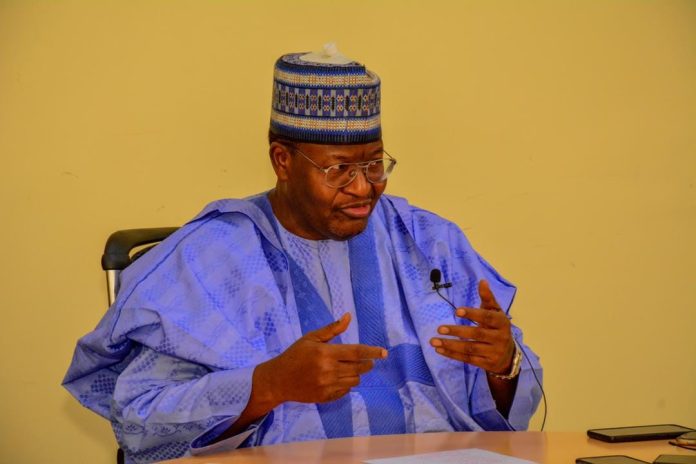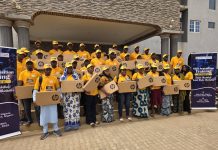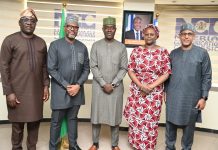…Urges youths to embrace digital skills acquisition
The adoption and utilisation of Information and Communication Technology (ICT) is synonymous with empowerment, as it transforms processes efficiently acting as an enabler of effectiveness in operations in every sector of the economy, including commerce, agriculture, health, security and governance.
Prof. Umar Garba Danbatta, the Executive Vice Chairman (EVC) of the Nigerian Communications Commission (NCC), made this assertion on Thursday, January 13, 2022, while delivering the 10th and 11th combined Convocation Lecture of the Fountain University at Osogbo, Osun State.
In the paper titled: “Empowering the Nigerian Youth though Information and Communication Technology”, Danbatta recalled the impact of ICT revolution in all parts of human endeavour across countries and continents, insisting that technology will continue to penetrate and foster qualitative and quantifiable changes in all aspects of life.
In all continents of the world, people, organisations and countries have continued to witness leaps and bounds in economic, social and political activities through instrumentality of ICT, which, according to Danbatta, has meshed computing, information and communication technology to catalyse development in ways and manners humans never envisaged decades ago.
According to Danbatta, Uber, the world’s largest taxi company, owns no vehicle; Airbnb, the world’s largest accommodation provider, owns no real estate; Facebook, world’s most popular public-facing digitally-mediated social networking platform, creates little or no content; Alibaba, a leading global retailer, has little or no inventory, yet they have become signposts of prosperity riding wholly on ICT resources.
To Danbatta, it would be a failing prophesy decades ago if anyone had said a company with no vehicle, just via an application, will control more than 75 million active commercial drivers in, at least, 80 countries. It would also be contested that through a mere app, a company will provide accommodation to millions of travellers and tourists in more than 100,000 cities of the world.
Similarly, just as Alibaba, without inventory, had over 828 million annual active customers across its China retail markets, as at June 2021. Needless to mention that the troves of contents synonymous with Facebook are actually generated by its 2.89 billion monthly active users.
The NCC CEO stated that the foregoing contextual demonstrations of the possibilities of ICT explain Federal Government’s policy decisions to strengthen ICT adoption in building a robust digital economy in Nigeria, eloquently expressed in the National Digital Economy Policy and Strategy (NDEPS), 2020-2030; the Nigerian National Broadband Plan (NNBP), 2020-2025 and other series of policies, guidelines and regulations derivative of the NDEPS and NNBP.
He explained that adoption of digital revolutions by government is creating multiplier effects across critical sectors, aiding job creation, better governance, youth empowerment and overall socio-economic development. “It is the reason this objective reality is cited as the Fourth Industrial Revolution (4IR).
Indeed, for over 10 years, ICT has consistent contributed more than 10 per cent of the Nigeria’s Gross Domestic Product (GDP) – the telecom sector alone contributed 12.45 per cent to GDP as at the fourth quarter of 2020,” he said.
Given that Nigeria accounts for 82 per cent of Africa’s ICT market and 29 per cent of continental Internet usage and sub-Sahara Africa being the fastest growing region for ICT adoption, the Federal Government, in its determination to ensure that the nation harness full benefits of ICT, instituted a broadband vision that will see Nigeria as a society of connected communities of high-speed broadband access and connectivity.
The EVC said the envisioned society will deliver Internet connectivity speed 10 megabits per second (Mbps) in rural areas and 25 Mbps in urban areas by 2025. Additionally, effective coverage will be available to, at least, 90 per cent of the population by 2025 at a price not more than N390 per one gigabyte of data.
Explicating further, the professor of telecommunications engineering informed the audience that the NCC has connected to the policies of government through its Strategic Management Plan (SMP) 2020-2024 and the Strategic Vision Plan (SVP), 2021-2025, which streamline the provision of key extant policies for effective implementation by the Commission.
Danbatta, therefore, passionately appealed to the Nigerian youths to take advantage of Federal Government’s laudable policies, which have found expression in many activities of the Commission targeting the Nigerian youths. These activities and interventionist programmes has, as primer, the ICT Hubs Support and Engagement programme, which brings youths together in the Nigerian tech ecosystem to deliberate and recommend frameworks and strategies for the development of the sector.
He stated that the overarching objective of the engagement is to harness the innovative and creative energy of the young people to promote ICT innovation and entrepreneurship, provide the linkage between policy makers, industry, entrepreneurs and tech enthusiasts to leverage the power of digital technology through local content development. “This engagement and collaboration aligns with the Commission’s policy of inclusiveness which by the reckoning of development scholars, is imperative for growth and development,” he said.
Earlier in his welcome address, the Vice Chancellor of the University, Prof. Olalekan Sanni, described Prof. Danbatta as an accomplished academician and administrator, whose wealth of experience was considered worthy of tapping into by the university community towards proffering solutions to the issue of youth empowerment and to suggest ways for enhancing Nigeria’s socio-economic life through effective leveraging of ICT.








